
The Project Gutenberg EBook Adventures of Tom Sawyer, by Twain, V5 #109 in our series by Mark Twain (Samuel Clemens) Copyright laws are changing all over the world. Be sure to check the copyright laws for your country before downloading or redistributing this or any other Project Gutenberg eBook. This header should be the first thing seen when viewing this Project Gutenberg file. Please do not remove it. Do not change or edit the header without written permission. Please read the "legal small print," and other information about the eBook and Project Gutenberg at the bottom of this file. Included is important information about your specific rights and restrictions in how the file may be used. You can also find out about how to make a donation to Project Gutenberg, and how to get involved. **Welcome To The World of Free Plain Vanilla Electronic Texts** **EBooks Readable By Both Humans and By Computers, Since 1971** *****These EBooks Were Prepared By Thousands of Volunteers***** Title: The Adventures of Tom Sawyer, Volume 5. Author: Mark Twain (Samuel Clemens) Release Date: December 2004 [EBook #7197] [This file was first posted on March 26, 2003] Edition: 10 Language: English Character set encoding: ASCII *** START OF THE PROJECT GUTENBERG EBOOK TOM SAWYER, TWAIN, V5 *** This file was produced by David Widger, [widger@cecomet.net]





CHAPTER XVIII. Tom's Feelings Investigated--Wonderful Dream--Becky Thatcher Overshadowed --Tom Becomes Jealous--Black Revenge
CHAPTER XIX. Tom Tells the Truth
CHAPTER XX. Becky in a Dilemma--Tom's Nobility Asserts Itself
CHAPTER XXI. Youthful Eloquence--Compositions by the Young Ladies--A Lengthy Vision --The Boy's Vengeance Satisfied
CHAPTER XXII. Tom's Confidence Betrayed--Expects Signal Punishment
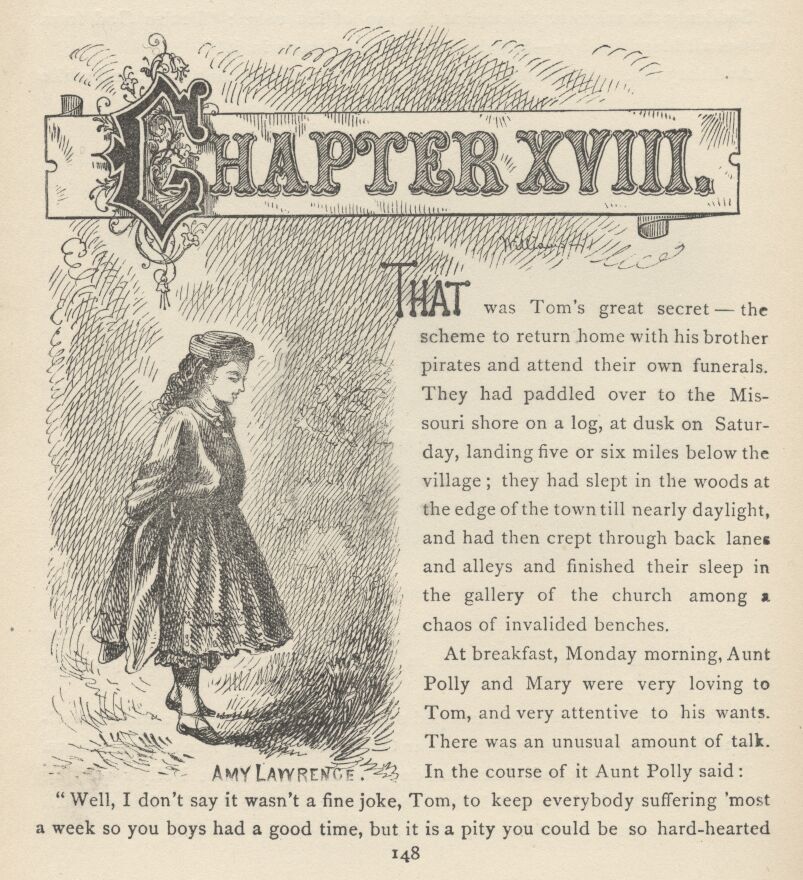
THAT was Tom's great secret—the scheme to return home with his brother pirates and attend their own funerals. They had paddled over to the Missouri shore on a log, at dusk on Saturday, landing five or six miles below the village; they had slept in the woods at the edge of the town till nearly daylight, and had then crept through back lanes and alleys and finished their sleep in the gallery of the church among a chaos of invalided benches.
At breakfast, Monday morning, Aunt Polly and Mary were very loving to Tom, and very attentive to his wants. There was an unusual amount of talk. In the course of it Aunt Polly said:
"Well, I don't say it wasn't a fine joke, Tom, to keep everybody suffering 'most a week so you boys had a good time, but it is a pity you could be so hard-hearted as to let me suffer so. If you could come over on a log to go to your funeral, you could have come over and give me a hint some way that you warn't dead, but only run off."
"Yes, you could have done that, Tom," said Mary; "and I believe you would if you had thought of it."
"Would you, Tom?" said Aunt Polly, her face lighting wistfully. "Say, now, would you, if you'd thought of it?"
"I—well, I don't know. 'Twould 'a' spoiled everything."
"Tom, I hoped you loved me that much," said Aunt Polly, with a grieved tone that discomforted the boy. "It would have been something if you'd cared enough to THINK of it, even if you didn't DO it."
"Now, auntie, that ain't any harm," pleaded Mary; "it's only Tom's giddy way—he is always in such a rush that he never thinks of anything."
"More's the pity. Sid would have thought. And Sid would have come and DONE it, too. Tom, you'll look back, some day, when it's too late, and wish you'd cared a little more for me when it would have cost you so little."
"Now, auntie, you know I do care for you," said Tom.
"I'd know it better if you acted more like it."
"I wish now I'd thought," said Tom, with a repentant tone; "but I dreamt about you, anyway. That's something, ain't it?"
"It ain't much—a cat does that much—but it's better than nothing. What did you dream?"
"Why, Wednesday night I dreamt that you was sitting over there by the bed, and Sid was sitting by the woodbox, and Mary next to him."
"Well, so we did. So we always do. I'm glad your dreams could take even that much trouble about us."
"And I dreamt that Joe Harper's mother was here."
"Why, she was here! Did you dream any more?"
"Oh, lots. But it's so dim, now."
"Well, try to recollect—can't you?"
"Somehow it seems to me that the wind—the wind blowed the—the—"
"Try harder, Tom! The wind did blow something. Come!"
Tom pressed his fingers on his forehead an anxious minute, and then said:
"I've got it now! I've got it now! It blowed the candle!"
"Mercy on us! Go on, Tom—go on!"
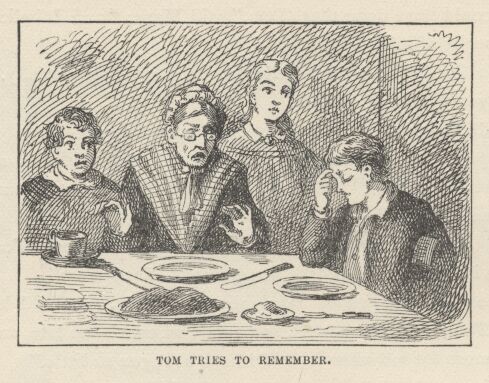
"And it seems to me that you said, 'Why, I believe that that door—'"
"Go ON, Tom!"
"Just let me study a moment—just a moment. Oh, yes—you said you believed the door was open."
"As I'm sitting here, I did! Didn't I, Mary! Go on!"
"And then—and then—well I won't be certain, but it seems like as if you made Sid go and—and—"
"Well? Well? What did I make him do, Tom? What did I make him do?"
"You made him—you—Oh, you made him shut it."
"Well, for the land's sake! I never heard the beat of that in all my days! Don't tell ME there ain't anything in dreams, any more. Sereny Harper shall know of this before I'm an hour older. I'd like to see her get around THIS with her rubbage 'bout superstition. Go on, Tom!"
"Oh, it's all getting just as bright as day, now. Next you said I warn't BAD, only mischeevous and harum-scarum, and not any more responsible than—than—I think it was a colt, or something."
"And so it was! Well, goodness gracious! Go on, Tom!"
"And then you began to cry."
"So I did. So I did. Not the first time, neither. And then—"
"Then Mrs. Harper she began to cry, and said Joe was just the same, and she wished she hadn't whipped him for taking cream when she'd throwed it out her own self—"
"Tom! The sperrit was upon you! You was a prophesying—that's what you was doing! Land alive, go on, Tom!"
"Then Sid he said—he said—"
"I don't think I said anything," said Sid.
"Yes you did, Sid," said Mary.
"Shut your heads and let Tom go on! What did he say, Tom?"
"He said—I THINK he said he hoped I was better off where I was gone to, but if I'd been better sometimes—"
"THERE, d'you hear that! It was his very words!"
"And you shut him up sharp."
"I lay I did! There must 'a' been an angel there. There WAS an angel there, somewheres!"
"And Mrs. Harper told about Joe scaring her with a firecracker, and you told about Peter and the Pain-killer—"
"Just as true as I live!"
"And then there was a whole lot of talk 'bout dragging the river for us, and 'bout having the funeral Sunday, and then you and old Miss Harper hugged and cried, and she went."
"It happened just so! It happened just so, as sure as I'm a-sitting in these very tracks. Tom, you couldn't told it more like if you'd 'a' seen it! And then what? Go on, Tom!"
"Then I thought you prayed for me—and I could see you and hear every word you said. And you went to bed, and I was so sorry that I took and wrote on a piece of sycamore bark, 'We ain't dead—we are only off being pirates,' and put it on the table by the candle; and then you looked so good, laying there asleep, that I thought I went and leaned over and kissed you on the lips."
"Did you, Tom, DID you! I just forgive you everything for that!" And she seized the boy in a crushing embrace that made him feel like the guiltiest of villains.
"It was very kind, even though it was only a—dream," Sid soliloquized just audibly.
"Shut up, Sid! A body does just the same in a dream as he'd do if he was awake. Here's a big Milum apple I've been saving for you, Tom, if you was ever found again—now go 'long to school. I'm thankful to the good God and Father of us all I've got you back, that's long-suffering and merciful to them that believe on Him and keep His word, though goodness knows I'm unworthy of it, but if only the worthy ones got His blessings and had His hand to help them over the rough places, there's few enough would smile here or ever enter into His rest when the long night comes. Go 'long Sid, Mary, Tom—take yourselves off—you've hendered me long enough."
The children left for school, and the old lady to call on Mrs. Harper and vanquish her realism with Tom's marvellous dream. Sid had better judgment than to utter the thought that was in his mind as he left the house. It was this: "Pretty thin—as long a dream as that, without any mistakes in it!"
What a hero Tom was become, now! He did not go skipping and prancing, but moved with a dignified swagger as became a pirate who felt that the public eye was on him. And indeed it was; he tried not to seem to see the looks or hear the remarks as he passed along, but they were food and drink to him. Smaller boys than himself flocked at his heels, as proud to be seen with him, and tolerated by him, as if he had been the drummer at the head of a procession or the elephant leading a menagerie into town. Boys of his own size pretended not to know he had been away at all; but they were consuming with envy, nevertheless. They would have given anything to have that swarthy sun-tanned skin of his, and his glittering notoriety; and Tom would not have parted with either for a circus.
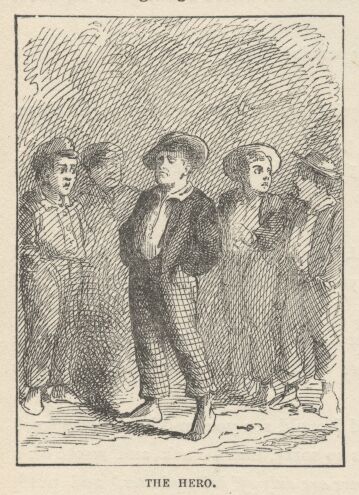
At school the children made so much of him and of Joe, and delivered such eloquent admiration from their eyes, that the two heroes were not long in becoming insufferably "stuck-up." They began to tell their adventures to hungry listeners—but they only began; it was not a thing likely to have an end, with imaginations like theirs to furnish material. And finally, when they got out their pipes and went serenely puffing around, the very summit of glory was reached.
Tom decided that he could be independent of Becky Thatcher now. Glory was sufficient. He would live for glory. Now that he was distinguished, maybe she would be wanting to "make up." Well, let her—she should see that he could be as indifferent as some other people. Presently she arrived. Tom pretended not to see her. He moved away and joined a group of boys and girls and began to talk. Soon he observed that she was tripping gayly back and forth with flushed face and dancing eyes, pretending to be busy chasing schoolmates, and screaming with laughter when she made a capture; but he noticed that she always made her captures in his vicinity, and that she seemed to cast a conscious eye in his direction at such times, too. It gratified all the vicious vanity that was in him; and so, instead of winning him, it only "set him up" the more and made him the more diligent to avoid betraying that he knew she was about. Presently she gave over skylarking, and moved irresolutely about, sighing once or twice and glancing furtively and wistfully toward Tom. Then she observed that now Tom was talking more particularly to Amy Lawrence than to any one else. She felt a sharp pang and grew disturbed and uneasy at once. She tried to go away, but her feet were treacherous, and carried her to the group instead. She said to a girl almost at Tom's elbow—with sham vivacity:
"Why, Mary Austin! you bad girl, why didn't you come to Sunday-school?"
"I did come—didn't you see me?"
"Why, no! Did you? Where did you sit?"
"I was in Miss Peters' class, where I always go. I saw YOU."
"Did you? Why, it's funny I didn't see you. I wanted to tell you about the picnic."
"Oh, that's jolly. Who's going to give it?"
"My ma's going to let me have one."
"Oh, goody; I hope she'll let ME come."
"Well, she will. The picnic's for me. She'll let anybody come that I want, and I want you."
"That's ever so nice. When is it going to be?"
"By and by. Maybe about vacation."
"Oh, won't it be fun! You going to have all the girls and boys?"
"Yes, every one that's friends to me—or wants to be"; and she glanced ever so furtively at Tom, but he talked right along to Amy Lawrence about the terrible storm on the island, and how the lightning tore the great sycamore tree "all to flinders" while he was "standing within three feet of it."
"Oh, may I come?" said Grace Miller.
"Yes."
"And me?" said Sally Rogers.
"Yes."
"And me, too?" said Susy Harper. "And Joe?"
"Yes."
And so on, with clapping of joyful hands till all the group had begged for invitations but Tom and Amy. Then Tom turned coolly away, still talking, and took Amy with him. Becky's lips trembled and the tears came to her eyes; she hid these signs with a forced gayety and went on chattering, but the life had gone out of the picnic, now, and out of everything else; she got away as soon as she could and hid herself and had what her sex call "a good cry." Then she sat moody, with wounded pride, till the bell rang. She roused up, now, with a vindictive cast in her eye, and gave her plaited tails a shake and said she knew what SHE'D do.
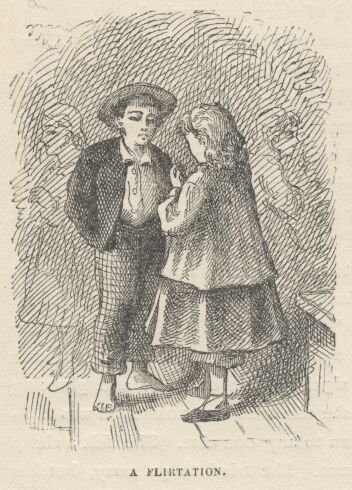
At recess Tom continued his flirtation with Amy with jubilant self-satisfaction. And he kept drifting about to find Becky and lacerate her with the performance. At last he spied her, but there was a sudden falling of his mercury. She was sitting cosily on a little bench behind the schoolhouse looking at a picture-book with Alfred Temple—and so absorbed were they, and their heads so close together over the book, that they did not seem to be conscious of anything in the world besides. Jealousy ran red-hot through Tom's veins. He began to hate himself for throwing away the chance Becky had offered for a reconciliation. He called himself a fool, and all the hard names he could think of. He wanted to cry with vexation. Amy chatted happily along, as they walked, for her heart was singing, but Tom's tongue had lost its function. He did not hear what Amy was saying, and whenever she paused expectantly he could only stammer an awkward assent, which was as often misplaced as otherwise. He kept drifting to the rear of the schoolhouse, again and again, to sear his eyeballs with the hateful spectacle there. He could not help it. And it maddened him to see, as he thought he saw, that Becky Thatcher never once suspected that he was even in the land of the living. But she did see, nevertheless; and she knew she was winning her fight, too, and was glad to see him suffer as she had suffered.
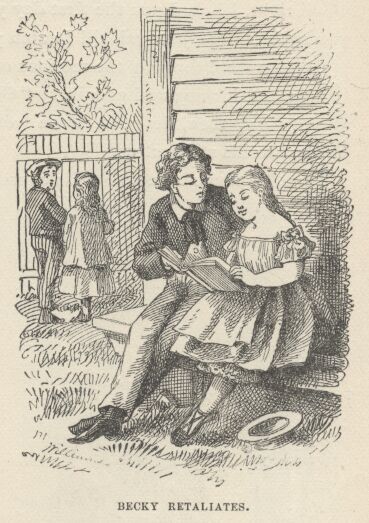
Amy's happy prattle became intolerable. Tom hinted at things he had to attend to; things that must be done; and time was fleeting. But in vain —the girl chirped on. Tom thought, "Oh, hang her, ain't I ever going to get rid of her?" At last he must be attending to those things—and she said artlessly that she would be "around" when school let out. And he hastened away, hating her for it.
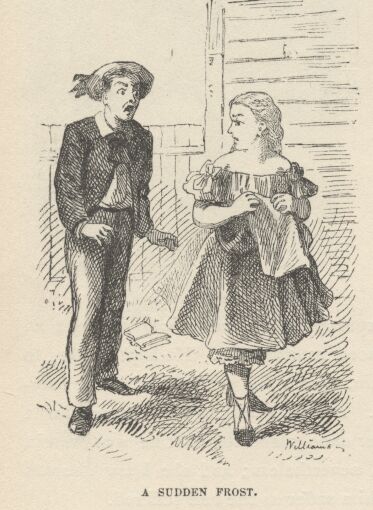
"Any other boy!" Tom thought, grating his teeth. "Any boy in the whole town but that Saint Louis smarty that thinks he dresses so fine and is aristocracy! Oh, all right, I licked you the first day you ever saw this town, mister, and I'll lick you again! You just wait till I catch you out! I'll just take and—"
And he went through the motions of thrashing an imaginary boy— pummelling the air, and kicking and gouging. "Oh, you do, do you? You holler 'nough, do you? Now, then, let that learn you!" And so the imaginary flogging was finished to his satisfaction.
Tom fled home at noon. His conscience could not endure any more of Amy's grateful happiness, and his jealousy could bear no more of the other distress. Becky resumed her picture inspections with Alfred, but as the minutes dragged along and no Tom came to suffer, her triumph began to cloud and she lost interest; gravity and absentmindedness followed, and then melancholy; two or three times she pricked up her ear at a footstep, but it was a false hope; no Tom came. At last she grew entirely miserable and wished she hadn't carried it so far. When poor Alfred, seeing that he was losing her, he did not know how, kept exclaiming: "Oh, here's a jolly one! look at this!" she lost patience at last, and said, "Oh, don't bother me! I don't care for them!" and burst into tears, and got up and walked away.
Alfred dropped alongside and was going to try to comfort her, but she said:
"Go away and leave me alone, can't you! I hate you!"
So the boy halted, wondering what he could have done—for she had said she would look at pictures all through the nooning—and she walked on, crying. Then Alfred went musing into the deserted schoolhouse. He was humiliated and angry. He easily guessed his way to the truth—the girl had simply made a convenience of him to vent her spite upon Tom Sawyer. He was far from hating Tom the less when this thought occurred to him. He wished there was some way to get that boy into trouble without much risk to himself. Tom's spelling-book fell under his eye. Here was his opportunity. He gratefully opened to the lesson for the afternoon and poured ink upon the page.
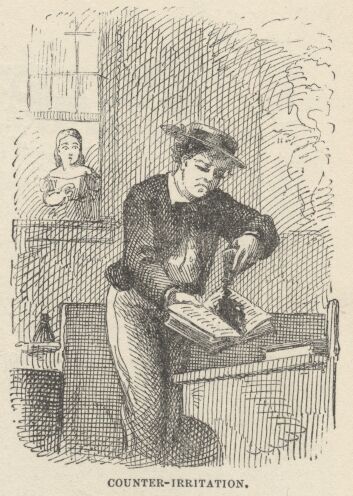
Becky, glancing in at a window behind him at the moment, saw the act, and moved on, without discovering herself. She started homeward, now, intending to find Tom and tell him; Tom would be thankful and their troubles would be healed. Before she was half way home, however, she had changed her mind. The thought of Tom's treatment of her when she was talking about her picnic came scorching back and filled her with shame. She resolved to let him get whipped on the damaged spelling-book's account, and to hate him forever, into the bargain.
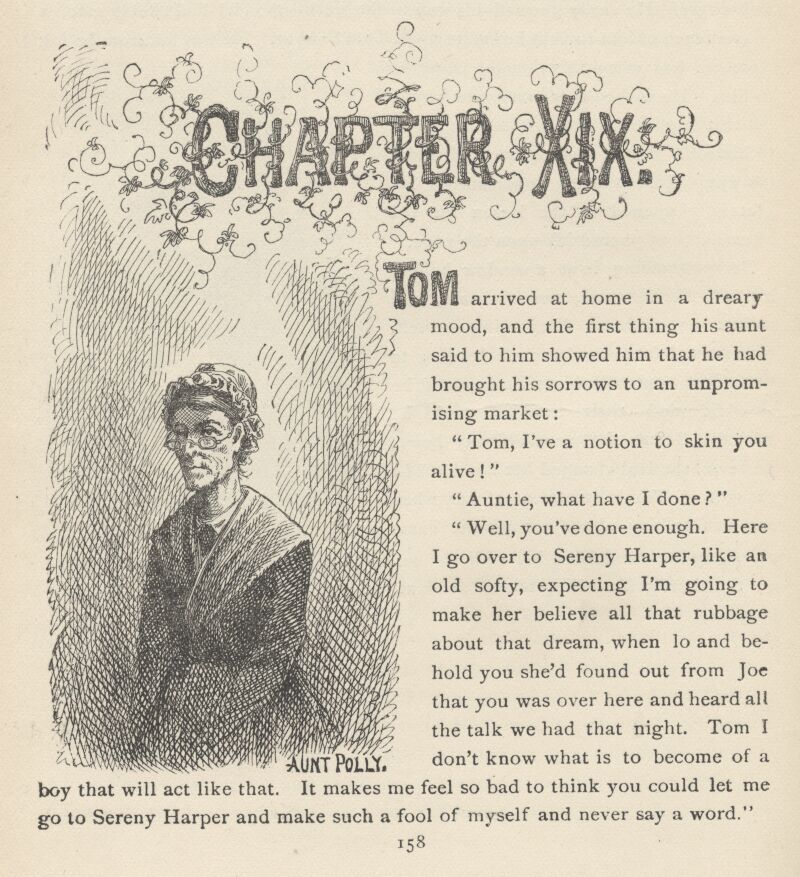
TOM arrived at home in a dreary mood, and the first thing his aunt said to him showed him that he had brought his sorrows to an unpromising market:
"Tom, I've a notion to skin you alive!"
"Auntie, what have I done?"
"Well, you've done enough. Here I go over to Sereny Harper, like an old softy, expecting I'm going to make her believe all that rubbage about that dream, when lo and behold you she'd found out from Joe that you was over here and heard all the talk we had that night. Tom, I don't know what is to become of a boy that will act like that. It makes me feel so bad to think you could let me go to Sereny Harper and make such a fool of myself and never say a word."
This was a new aspect of the thing. His smartness of the morning had seemed to Tom a good joke before, and very ingenious. It merely looked mean and shabby now. He hung his head and could not think of anything to say for a moment. Then he said:
"Auntie, I wish I hadn't done it—but I didn't think."
"Oh, child, you never think. You never think of anything but your own selfishness. You could think to come all the way over here from Jackson's Island in the night to laugh at our troubles, and you could think to fool me with a lie about a dream; but you couldn't ever think to pity us and save us from sorrow."
"Auntie, I know now it was mean, but I didn't mean to be mean. I didn't, honest. And besides, I didn't come over here to laugh at you that night."
"What did you come for, then?"
"It was to tell you not to be uneasy about us, because we hadn't got drownded."
"Tom, Tom, I would be the thankfullest soul in this world if I could believe you ever had as good a thought as that, but you know you never did—and I know it, Tom."
"Indeed and 'deed I did, auntie—I wish I may never stir if I didn't."
"Oh, Tom, don't lie—don't do it. It only makes things a hundred times worse."
"It ain't a lie, auntie; it's the truth. I wanted to keep you from grieving—that was all that made me come."
"I'd give the whole world to believe that—it would cover up a power of sins, Tom. I'd 'most be glad you'd run off and acted so bad. But it ain't reasonable; because, why didn't you tell me, child?"
"Why, you see, when you got to talking about the funeral, I just got all full of the idea of our coming and hiding in the church, and I couldn't somehow bear to spoil it. So I just put the bark back in my pocket and kept mum."
"What bark?"
"The bark I had wrote on to tell you we'd gone pirating. I wish, now, you'd waked up when I kissed you—I do, honest."
The hard lines in his aunt's face relaxed and a sudden tenderness dawned in her eyes.
"DID you kiss me, Tom?"
"Why, yes, I did."
"Are you sure you did, Tom?"
"Why, yes, I did, auntie—certain sure."
"What did you kiss me for, Tom?"
"Because I loved you so, and you laid there moaning and I was so sorry."
The words sounded like truth. The old lady could not hide a tremor in her voice when she said:
"Kiss me again, Tom!—and be off with you to school, now, and don't bother me any more."
The moment he was gone, she ran to a closet and got out the ruin of a jacket which Tom had gone pirating in. Then she stopped, with it in her hand, and said to herself:
"No, I don't dare. Poor boy, I reckon he's lied about it—but it's a blessed, blessed lie, there's such a comfort come from it. I hope the Lord—I KNOW the Lord will forgive him, because it was such good-heartedness in him to tell it. But I don't want to find out it's a lie. I won't look."
She put the jacket away, and stood by musing a minute. Twice she put out her hand to take the garment again, and twice she refrained. Once more she ventured, and this time she fortified herself with the thought: "It's a good lie—it's a good lie—I won't let it grieve me." So she sought the jacket pocket. A moment later she was reading Tom's piece of bark through flowing tears and saying: "I could forgive the boy, now, if he'd committed a million sins!"
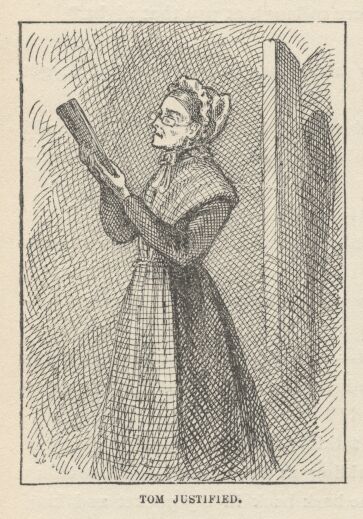
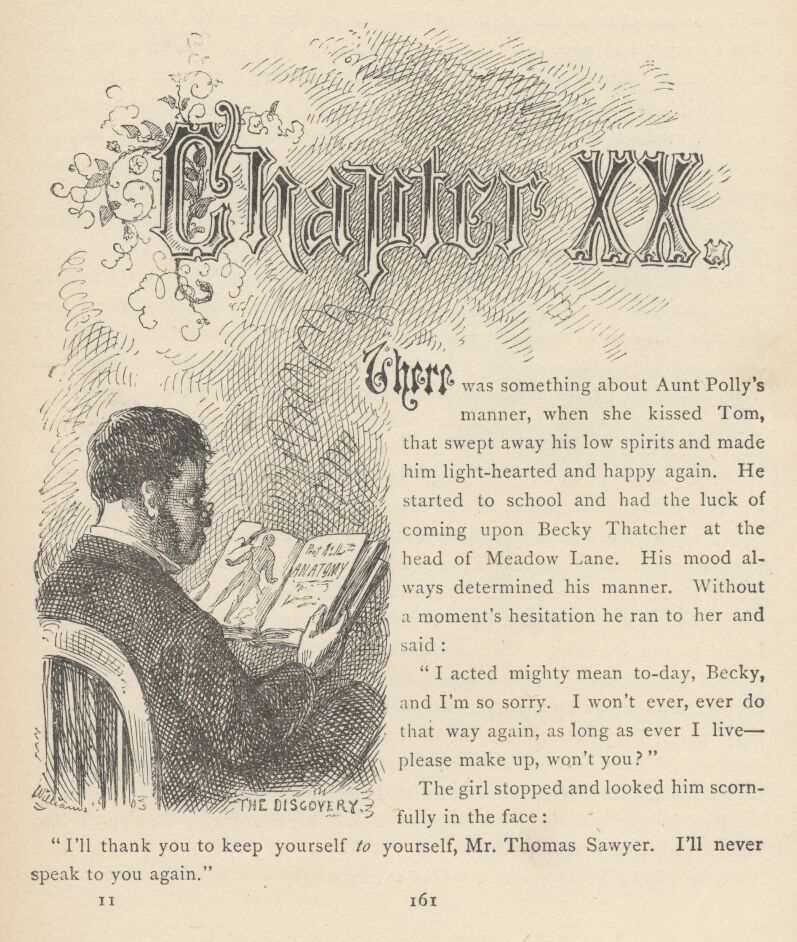
THERE was something about Aunt Polly's manner, when she kissed Tom, that swept away his low spirits and made him lighthearted and happy again. He started to school and had the luck of coming upon Becky Thatcher at the head of Meadow Lane. His mood always determined his manner. Without a moment's hesitation he ran to her and said:
"I acted mighty mean today, Becky, and I'm so sorry. I won't ever, ever do that way again, as long as ever I live—please make up, won't you?"
The girl stopped and looked him scornfully in the face:
"I'll thank you to keep yourself TO yourself, Mr. Thomas Sawyer. I'll never speak to you again."
She tossed her head and passed on. Tom was so stunned that he had not even presence of mind enough to say "Who cares, Miss Smarty?" until the right time to say it had gone by. So he said nothing. But he was in a fine rage, nevertheless. He moped into the schoolyard wishing she were a boy, and imagining how he would trounce her if she were. He presently encountered her and delivered a stinging remark as he passed. She hurled one in return, and the angry breach was complete. It seemed to Becky, in her hot resentment, that she could hardly wait for school to "take in," she was so impatient to see Tom flogged for the injured spelling-book. If she had had any lingering notion of exposing Alfred Temple, Tom's offensive fling had driven it entirely away.
Poor girl, she did not know how fast she was nearing trouble herself. The master, Mr. Dobbins, had reached middle age with an unsatisfied ambition. The darling of his desires was, to be a doctor, but poverty had decreed that he should be nothing higher than a village schoolmaster. Every day he took a mysterious book out of his desk and absorbed himself in it at times when no classes were reciting. He kept that book under lock and key. There was not an urchin in school but was perishing to have a glimpse of it, but the chance never came. Every boy and girl had a theory about the nature of that book; but no two theories were alike, and there was no way of getting at the facts in the case. Now, as Becky was passing by the desk, which stood near the door, she noticed that the key was in the lock! It was a precious moment. She glanced around; found herself alone, and the next instant she had the book in her hands. The titlepage—Professor Somebody's ANATOMY— carried no information to her mind; so she began to turn the leaves. She came at once upon a handsomely engraved and colored frontispiece—a human figure, stark naked. At that moment a shadow fell on the page and Tom Sawyer stepped in at the door and caught a glimpse of the picture. Becky snatched at the book to close it, and had the hard luck to tear the pictured page half down the middle. She thrust the volume into the desk, turned the key, and burst out crying with shame and vexation.
"Tom Sawyer, you are just as mean as you can be, to sneak up on a person and look at what they're looking at."
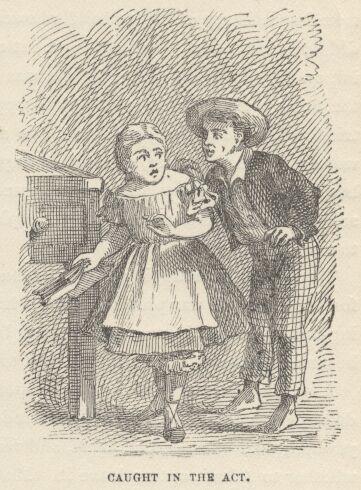
"How could I know you was looking at anything?"
"You ought to be ashamed of yourself, Tom Sawyer; you know you're going to tell on me, and oh, what shall I do, what shall I do! I'll be whipped, and I never was whipped in school."
Then she stamped her little foot and said:
"BE so mean if you want to! I know something that's going to happen. You just wait and you'll see! Hateful, hateful, hateful!"—and she flung out of the house with a new explosion of crying.
Tom stood still, rather flustered by this onslaught. Presently he said to himself:
"What a curious kind of a fool a girl is! Never been licked in school! Shucks! What's a licking! That's just like a girl—they're so thin-skinned and chicken-hearted. Well, of course I ain't going to tell old Dobbins on this little fool, because there's other ways of getting even on her, that ain't so mean; but what of it? Old Dobbins will ask who it was tore his book. Nobody'll answer. Then he'll do just the way he always does—ask first one and then t'other, and when he comes to the right girl he'll know it, without any telling. Girls' faces always tell on them. They ain't got any backbone. She'll get licked. Well, it's a kind of a tight place for Becky Thatcher, because there ain't any way out of it." Tom conned the thing a moment longer, and then added: "All right, though; she'd like to see me in just such a fix—let her sweat it out!"
Tom joined the mob of skylarking scholars outside. In a few moments the master arrived and school "took in." Tom did not feel a strong interest in his studies. Every time he stole a glance at the girls' side of the room Becky's face troubled him. Considering all things, he did not want to pity her, and yet it was all he could do to help it. He could get up no exultation that was really worthy the name. Presently the spelling-book discovery was made, and Tom's mind was entirely full of his own matters for a while after that. Becky roused up from her lethargy of distress and showed good interest in the proceedings. She did not expect that Tom could get out of his trouble by denying that he spilt the ink on the book himself; and she was right. The denial only seemed to make the thing worse for Tom. Becky supposed she would be glad of that, and she tried to believe she was glad of it, but she found she was not certain. When the worst came to the worst, she had an impulse to get up and tell on Alfred Temple, but she made an effort and forced herself to keep still—because, said she to herself, "he'll tell about me tearing the picture sure. I wouldn't say a word, not to save his life!"
Tom took his whipping and went back to his seat not at all broken-hearted, for he thought it was possible that he had unknowingly upset the ink on the spelling-book himself, in some skylarking bout—he had denied it for form's sake and because it was custom, and had stuck to the denial from principle.
A whole hour drifted by, the master sat nodding in his throne, the air was drowsy with the hum of study. By and by, Mr. Dobbins straightened himself up, yawned, then unlocked his desk, and reached for his book, but seemed undecided whether to take it out or leave it. Most of the pupils glanced up languidly, but there were two among them that watched his movements with intent eyes. Mr. Dobbins fingered his book absently for a while, then took it out and settled himself in his chair to read! Tom shot a glance at Becky. He had seen a hunted and helpless rabbit look as she did, with a gun levelled at its head. Instantly he forgot his quarrel with her. Quick—something must be done! done in a flash, too! But the very imminence of the emergency paralyzed his invention. Good!—he had an inspiration! He would run and snatch the book, spring through the door and fly. But his resolution shook for one little instant, and the chance was lost—the master opened the volume. If Tom only had the wasted opportunity back again! Too late. There was no help for Becky now, he said. The next moment the master faced the school. Every eye sank under his gaze. There was that in it which smote even the innocent with fear. There was silence while one might count ten—the master was gathering his wrath. Then he spoke: "Who tore this book?"
There was not a sound. One could have heard a pin drop. The stillness continued; the master searched face after face for signs of guilt.
"Benjamin Rogers, did you tear this book?"
A denial. Another pause.
"Joseph Harper, did you?"
Another denial. Tom's uneasiness grew more and more intense under the slow torture of these proceedings. The master scanned the ranks of boys —considered a while, then turned to the girls:
"Amy Lawrence?"
A shake of the head.
"Gracie Miller?"
The same sign.
"Susan Harper, did you do this?"
Another negative. The next girl was Becky Thatcher. Tom was trembling from head to foot with excitement and a sense of the hopelessness of the situation.
"Rebecca Thatcher" [Tom glanced at her face—it was white with terror] —"did you tear—no, look me in the face" [her hands rose in appeal] —"did you tear this book?"
A thought shot like lightning through Tom's brain. He sprang to his feet and shouted—"I done it!"
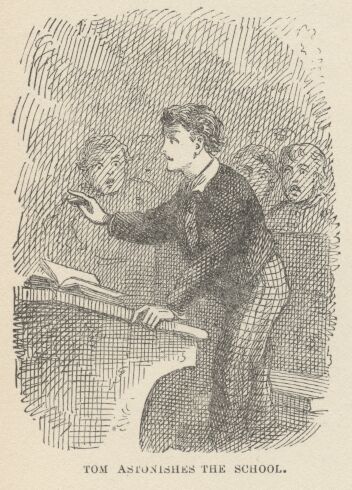
The school stared in perplexity at this incredible folly. Tom stood a moment, to gather his dismembered faculties; and when he stepped forward to go to his punishment the surprise, the gratitude, the adoration that shone upon him out of poor Becky's eyes seemed pay enough for a hundred floggings. Inspired by the splendor of his own act, he took without an outcry the most merciless flaying that even Mr. Dobbins had ever administered; and also received with indifference the added cruelty of a command to remain two hours after school should be dismissed—for he knew who would wait for him outside till his captivity was done, and not count the tedious time as loss, either.
Tom went to bed that night planning vengeance against Alfred Temple; for with shame and repentance Becky had told him all, not forgetting her own treachery; but even the longing for vengeance had to give way, soon, to pleasanter musings, and he fell asleep at last with Becky's latest words lingering dreamily in his ear—
"Tom, how COULD you be so noble!"
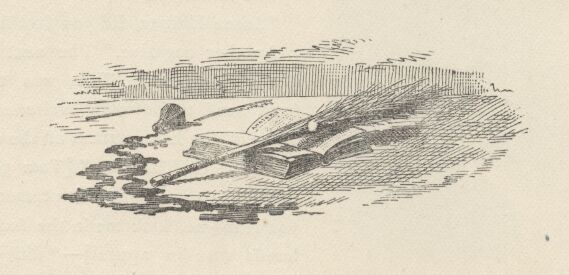
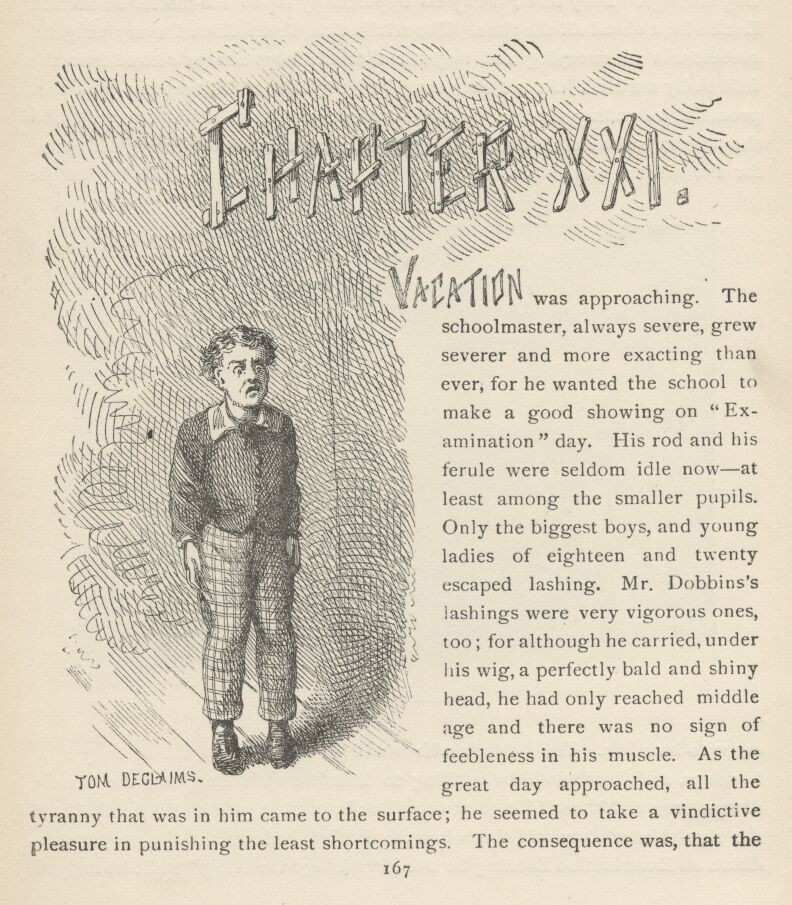
VACATION was approaching. The schoolmaster, always severe, grew severer and more exacting than ever, for he wanted the school to make a good showing on "Examination" day. His rod and his ferule were seldom idle now—at least among the smaller pupils. Only the biggest boys, and young ladies of eighteen and twenty, escaped lashing. Mr. Dobbins' lashings were very vigorous ones, too; for although he carried, under his wig, a perfectly bald and shiny head, he had only reached middle age, and there was no sign of feebleness in his muscle. As the great day approached, all the tyranny that was in him came to the surface; he seemed to take a vindictive pleasure in punishing the least shortcomings. The consequence was, that the smaller boys spent their days in terror and suffering and their nights in plotting revenge. They threw away no opportunity to do the master a mischief. But he kept ahead all the time. The retribution that followed every vengeful success was so sweeping and majestic that the boys always retired from the field badly worsted. At last they conspired together and hit upon a plan that promised a dazzling victory. They swore in the signpainter's boy, told him the scheme, and asked his help. He had his own reasons for being delighted, for the master boarded in his father's family and had given the boy ample cause to hate him. The master's wife would go on a visit to the country in a few days, and there would be nothing to interfere with the plan; the master always prepared himself for great occasions by getting pretty well fuddled, and the signpainter's boy said that when the dominie had reached the proper condition on Examination Evening he would "manage the thing" while he napped in his chair; then he would have him awakened at the right time and hurried away to school.
In the fulness of time the interesting occasion arrived. At eight in the evening the schoolhouse was brilliantly lighted, and adorned with wreaths and festoons of foliage and flowers. The master sat throned in his great chair upon a raised platform, with his blackboard behind him. He was looking tolerably mellow. Three rows of benches on each side and six rows in front of him were occupied by the dignitaries of the town and by the parents of the pupils. To his left, back of the rows of citizens, was a spacious temporary platform upon which were seated the scholars who were to take part in the exercises of the evening; rows of small boys, washed and dressed to an intolerable state of discomfort; rows of gawky big boys; snowbanks of girls and young ladies clad in lawn and muslin and conspicuously conscious of their bare arms, their grandmothers' ancient trinkets, their bits of pink and blue ribbon and the flowers in their hair. All the rest of the house was filled with non-participating scholars.
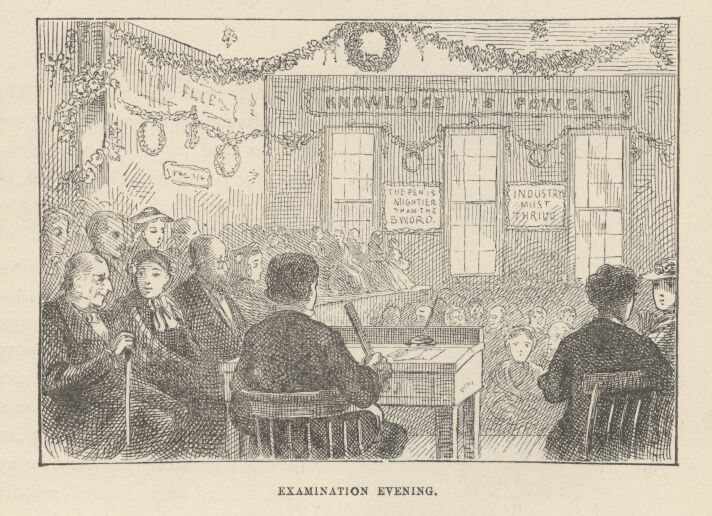
The exercises began. A very little boy stood up and sheepishly recited, "You'd scarce expect one of my age to speak in public on the stage," etc.—accompanying himself with the painfully exact and spasmodic gestures which a machine might have used—supposing the machine to be a trifle out of order. But he got through safely, though cruelly scared, and got a fine round of applause when he made his manufactured bow and retired.
A little shamefaced girl lisped, "Mary had a little lamb," etc., performed a compassion-inspiring curtsy, got her meed of applause, and sat down flushed and happy.
Tom Sawyer stepped forward with conceited confidence and soared into the unquenchable and indestructible "Give me liberty or give me death" speech, with fine fury and frantic gesticulation, and broke down in the middle of it. A ghastly stage-fright seized him, his legs quaked under him and he was like to choke. True, he had the manifest sympathy of the house but he had the house's silence, too, which was even worse than its sympathy. The master frowned, and this completed the disaster. Tom struggled awhile and then retired, utterly defeated. There was a weak attempt at applause, but it died early.
"The Boy Stood on the Burning Deck" followed; also "The Assyrian Came Down," and other declamatory gems. Then there were reading exercises, and a spelling fight. The meagre Latin class recited with honor. The prime feature of the evening was in order, now—original "compositions" by the young ladies. Each in her turn stepped forward to the edge of the platform, cleared her throat, held up her manuscript (tied with dainty ribbon), and proceeded to read, with labored attention to "expression" and punctuation. The themes were the same that had been illuminated upon similar occasions by their mothers before them, their grandmothers, and doubtless all their ancestors in the female line clear back to the Crusades. "Friendship" was one; "Memories of Other Days"; "Religion in History"; "Dream Land"; "The Advantages of Culture"; "Forms of Political Government Compared and Contrasted"; "Melancholy"; "Filial Love"; "Heart Longings," etc., etc.
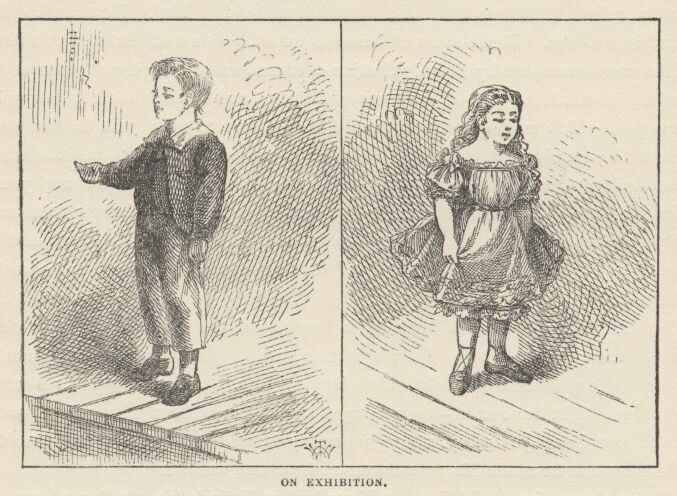
A prevalent feature in these compositions was a nursed and petted melancholy; another was a wasteful and opulent gush of "fine language"; another was a tendency to lug in by the ears particularly prized words and phrases until they were worn entirely out; and a peculiarity that conspicuously marked and marred them was the inveterate and intolerable sermon that wagged its crippled tail at the end of each and every one of them. No matter what the subject might be, a brainracking effort was made to squirm it into some aspect or other that the moral and religious mind could contemplate with edification. The glaring insincerity of these sermons was not sufficient to compass the banishment of the fashion from the schools, and it is not sufficient today; it never will be sufficient while the world stands, perhaps. There is no school in all our land where the young ladies do not feel obliged to close their compositions with a sermon; and you will find that the sermon of the most frivolous and the least religious girl in the school is always the longest and the most relentlessly pious. But enough of this. Homely truth is unpalatable.
Let us return to the "Examination." The first composition that was read was one entitled "Is this, then, Life?" Perhaps the reader can endure an extract from it:
"In the common walks of life, with what delightful emotions does the youthful mind look forward to some anticipated scene of festivity! Imagination is busy sketching rose-tinted pictures of joy. In fancy, the voluptuous votary of fashion sees herself amid the festive throng, 'the observed of all observers.' Her graceful form, arrayed in snowy robes, is whirling through the mazes of the joyous dance; her eye is brightest, her step is lightest in the gay assembly.
"In such delicious fancies time quickly glides by, and the welcome hour arrives for her entrance into the Elysian world, of which she has had such bright dreams. How fairy-like does everything appear to her enchanted vision! Each new scene is more charming than the last. But after a while she finds that beneath this goodly exterior, all is vanity, the flattery which once charmed her soul, now grates harshly upon her ear; the ballroom has lost its charms; and with wasted health and imbittered heart, she turns away with the conviction that earthly pleasures cannot satisfy the longings of the soul!"
And so forth and so on. There was a buzz of gratification from time to time during the reading, accompanied by whispered ejaculations of "How sweet!" "How eloquent!" "So true!" etc., and after the thing had closed with a peculiarly afflicting sermon the applause was enthusiastic.
Then arose a slim, melancholy girl, whose face had the "interesting" paleness that comes of pills and indigestion, and read a "poem." Two stanzas of it will do:
"A MISSOURI MAIDEN'S FAREWELL TO ALABAMA
"Alabama, goodbye! I love thee well!
But yet for a while do I leave thee now!
Sad, yes, sad thoughts of thee my heart doth swell,
And burning recollections throng my brow!
For I have wandered through thy flowery woods;
Have roamed and read near Tallapoosa's stream;
Have listened to Tallassee's warring floods,
And wooed on Coosa's side Aurora's beam."Yet shame I not to bear an o'erfull heart,
Nor blush to turn behind my tearful eyes;
'Tis from no stranger land I now must part,
'Tis to no strangers left I yield these sighs.
Welcome and home were mine within this State,
Whose vales I leave—whose spires fade fast from me
And cold must be mine eyes, and heart, and tete,
When, dear Alabama! they turn cold on thee!"
There were very few there who knew what "tete" meant, but the poem was very satisfactory, nevertheless.
Next appeared a dark-complexioned, black-eyed, black-haired young lady, who paused an impressive moment, assumed a tragic expression, and began to read in a measured, solemn tone:
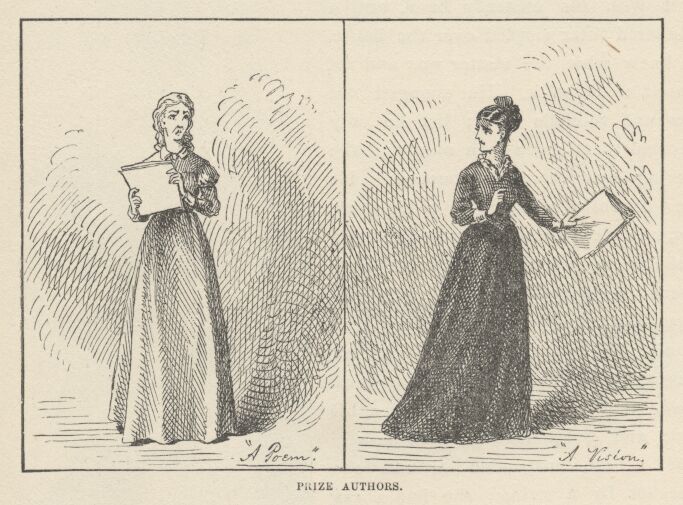
"A VISION
"Dark and tempestuous was night. Around the throne on high not a single star quivered; but the deep intonations of the heavy thunder constantly vibrated upon the ear; whilst the terrific lightning revelled in angry mood through the cloudy chambers of heaven, seeming to scorn the power exerted over its terror by the illustrious Franklin! Even the boisterous winds unanimously came forth from their mystic homes, and blustered about as if to enhance by their aid the wildness of the scene.
"At such a time, so dark,so dreary, for human sympathy my very spirit sighed; but instead thereof,
"'My dearest friend, my counsellor, my comforter and guide—My joy in grief, my second bliss in joy,' came to my side. She moved like one of those bright beings pictured in the sunny walks of fancy's Eden by the romantic and young, a queen of beauty unadorned save by her own transcendent loveliness. So soft was her step, it failed to make even a sound, and but for the magical thrill imparted by her genial touch, as other unobtrusive beauties, she would have glided away unperceived— unsought. A strange sadness rested upon her features, like icy tears upon the robe of December, as she pointed to the contending elements without, and bade me contemplate the two beings presented."
This nightmare occupied some ten pages of manuscript and wound up with a sermon so destructive of all hope to non-Presbyterians that it took the first prize. This composition was considered to be the very finest effort of the evening. The mayor of the village, in delivering the prize to the author of it, made a warm speech in which he said that it was by far the most "eloquent" thing he had ever listened to, and that Daniel Webster himself might well be proud of it.
It may be remarked, in passing, that the number of compositions in which the word "beauteous" was over-fondled, and human experience referred to as "life's page," was up to the usual average.
Now the master, mellow almost to the verge of geniality, put his chair aside, turned his back to the audience, and began to draw a map of America on the blackboard, to exercise the geography class upon. But he made a sad business of it with his unsteady hand, and a smothered titter rippled over the house. He knew what the matter was, and set himself to right it. He sponged out lines and remade them; but he only distorted them more than ever, and the tittering was more pronounced. He threw his entire attention upon his work, now, as if determined not to be put down by the mirth. He felt that all eyes were fastened upon him; he imagined he was succeeding, and yet the tittering continued; it even manifestly increased. And well it might. There was a garret above, pierced with a scuttle over his head; and down through this scuttle came a cat, suspended around the haunches by a string; she had a rag tied about her head and jaws to keep her from mewing; as she slowly descended she curved upward and clawed at the string, she swung downward and clawed at the intangible air. The tittering rose higher and higher—the cat was within six inches of the absorbed teacher's head—down, down, a little lower, and she grabbed his wig with her desperate claws, clung to it, and was snatched up into the garret in an instant with her trophy still in her possession! And how the light did blaze abroad from the master's bald pate—for the signpainter's boy had GILDED it!
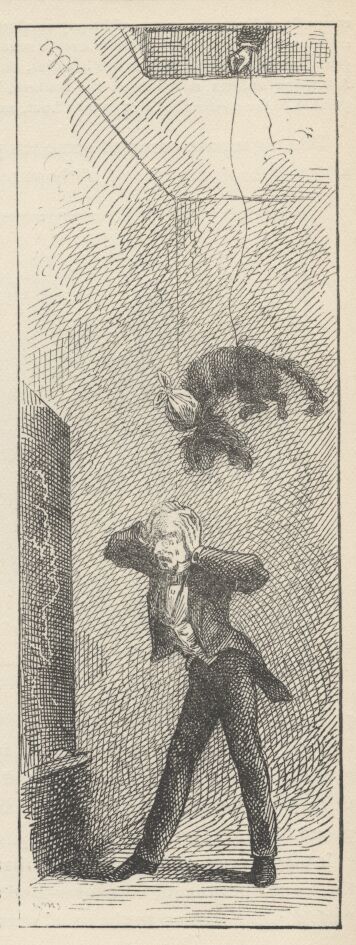
That broke up the meeting. The boys were avenged. Vacation had come.
NOTE:—The pretended "compositions" quoted in this chapter are taken without alteration from a volume entitled "Prose and Poetry, by a Western Lady"—but they are exactly and precisely after the schoolgirl pattern, and hence are much happier than any mere imitations could be.
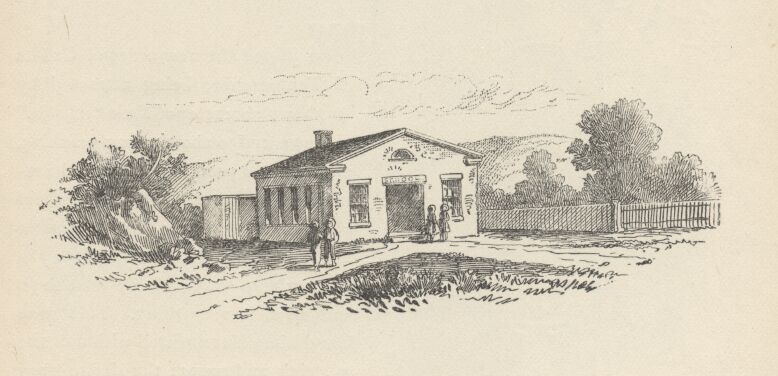
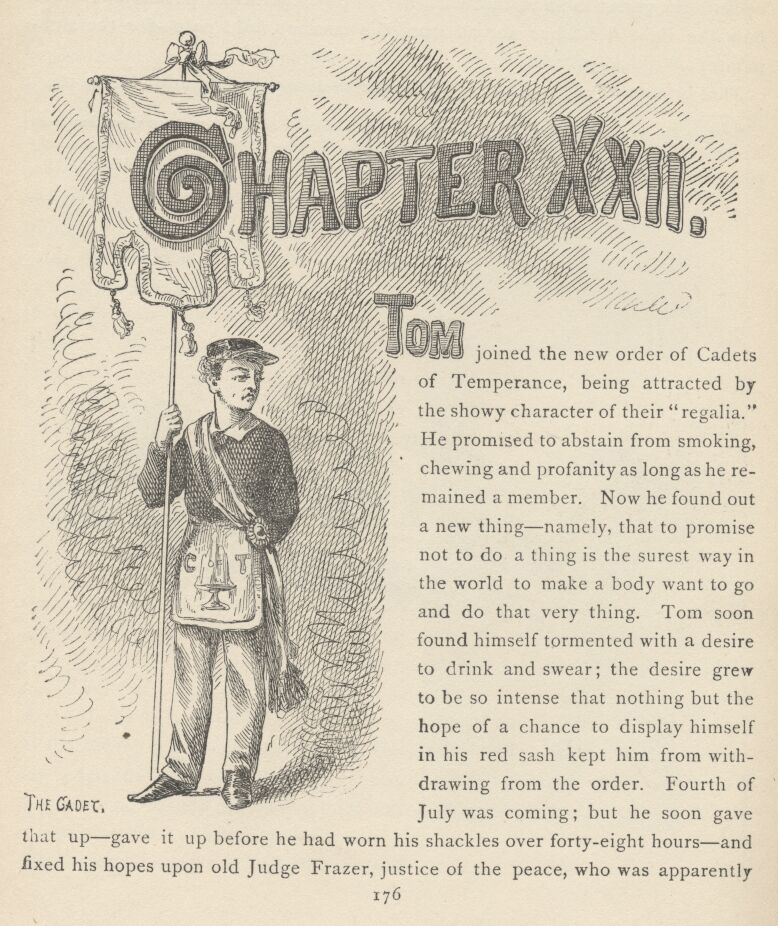
TOM joined the new order of Cadets of Temperance, being attracted by the showy character of their "regalia." He promised to abstain from smoking, chewing, and profanity as long as he remained a member. Now he found out a new thing—namely, that to promise not to do a thing is the surest way in the world to make a body want to go and do that very thing. Tom soon found himself tormented with a desire to drink and swear; the desire grew to be so intense that nothing but the hope of a chance to display himself in his red sash kept him from withdrawing from the order. Fourth of July was coming; but he soon gave that up— gave it up before he had worn his shackles over forty-eight hours—and fixed his hopes upon old Judge Frazer, justice of the peace, who was apparently on his deathbed and would have a big public funeral, since he was so high an official. During three days Tom was deeply concerned about the Judge's condition and hungry for news of it. Sometimes his hopes ran high—so high that he would venture to get out his regalia and practise before the looking-glass. But the Judge had a most discouraging way of fluctuating. At last he was pronounced upon the mend —and then convalescent. Tom was disgusted; and felt a sense of injury, too. He handed in his resignation at once—and that night the Judge suffered a relapse and died. Tom resolved that he would never trust a man like that again.
The funeral was a fine thing. The Cadets paraded in a style calculated to kill the late member with envy. Tom was a free boy again, however— there was something in that. He could drink and swear, now—but found to his surprise that he did not want to. The simple fact that he could, took the desire away, and the charm of it.
Tom presently wondered to find that his coveted vacation was beginning to hang a little heavily on his hands.
He attempted a diary—but nothing happened during three days, and so he abandoned it.
The first of all the negro minstrel shows came to town, and made a sensation. Tom and Joe Harper got up a band of performers and were happy for two days.
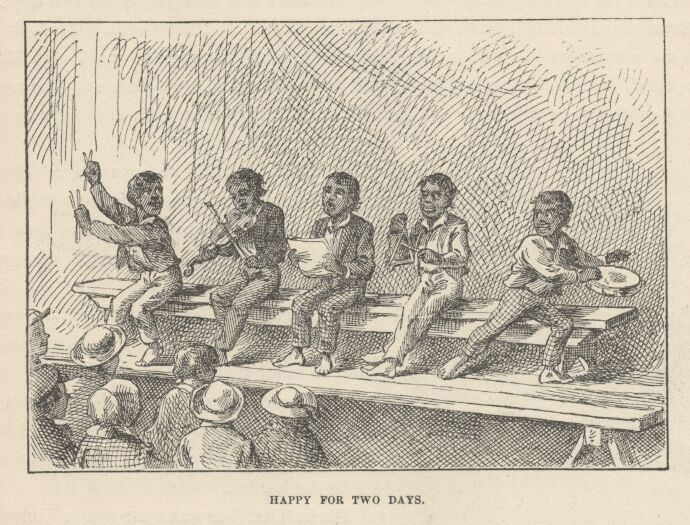
Even the Glorious Fourth was in some sense a failure, for it rained hard, there was no procession in consequence, and the greatest man in the world (as Tom supposed), Mr. Benton, an actual United States Senator, proved an overwhelming disappointment—for he was not twenty-five feet high, nor even anywhere in the neighborhood of it.
A circus came. The boys played circus for three days afterward in tents made of rag carpeting—admission, three pins for boys, two for girls —and then circusing was abandoned.
A phrenologist and a mesmerizer came—and went again and left the village duller and drearier than ever.
There were some boys-and-girls' parties, but they were so few and so delightful that they only made the aching voids between ache the harder.
Becky Thatcher was gone to her Constantinople home to stay with her parents during vacation—so there was no bright side to life anywhere.
The dreadful secret of the murder was a chronic misery. It was a very cancer for permanency and pain.
Then came the measles.
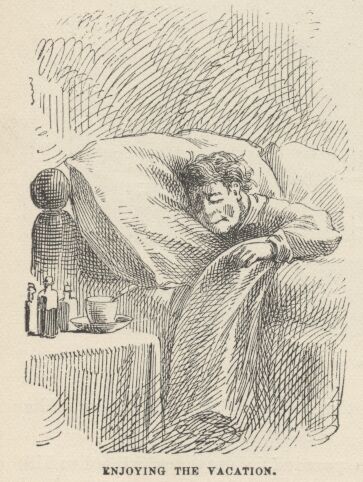
During two long weeks Tom lay a prisoner, dead to the world and its happenings. He was very ill, he was interested in nothing. When he got upon his feet at last and moved feebly downtown, a melancholy change had come over everything and every creature. There had been a "revival," and everybody had "got religion," not only the adults, but even the boys and girls. Tom went about, hoping against hope for the sight of one blessed sinful face, but disappointment crossed him everywhere. He found Joe Harper studying a Testament, and turned sadly away from the depressing spectacle. He sought Ben Rogers, and found him visiting the poor with a basket of tracts. He hunted up Jim Hollis, who called his attention to the precious blessing of his late measles as a warning. Every boy he encountered added another ton to his depression; and when, in desperation, he flew for refuge at last to the bosom of Huckleberry Finn and was received with a Scriptural quotation, his heart broke and he crept home and to bed realizing that he alone of all the town was lost, forever and forever.
And that night there came on a terrific storm, with driving rain, awful claps of thunder and blinding sheets of lightning. He covered his head with the bedclothes and waited in a horror of suspense for his doom; for he had not the shadow of a doubt that all this hubbub was about him. He believed he had taxed the forbearance of the powers above to the extremity of endurance and that this was the result. It might have seemed to him a waste of pomp and ammunition to kill a bug with a battery of artillery, but there seemed nothing incongruous about the getting up such an expensive thunderstorm as this to knock the turf from under an insect like himself.
By and by the tempest spent itself and died without accomplishing its object. The boy's first impulse was to be grateful, and reform. His second was to wait—for there might not be any more storms.
The next day the doctors were back; Tom had relapsed. The three weeks he spent on his back this time seemed an entire age. When he got abroad at last he was hardly grateful that he had been spared, remembering how lonely was his estate, how companionless and forlorn he was. He drifted listlessly down the street and found Jim Hollis acting as judge in a juvenile court that was trying a cat for murder, in the presence of her victim, a bird. He found Joe Harper and Huck Finn up an alley eating a stolen melon. Poor lads! they—like Tom—had suffered a relapse.
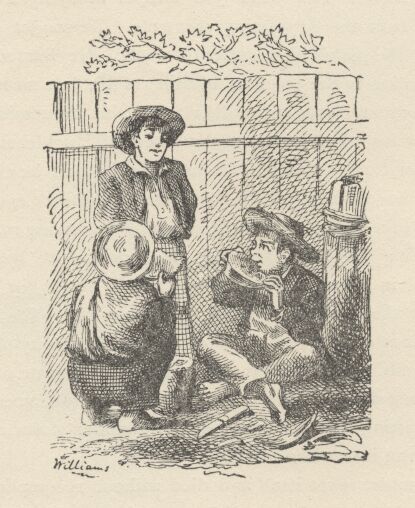
*** END OF THE PROJECT GUTENBERG EBOOK TOM SAWYER, TWAIN, V5 ***
***** This file should be named saw511h.html or saw511h.zip ****
Corrected EDITIONS of our eBooks get a new NUMBER, saw512h.html
VERSIONS based on separate sources get new LETTER, saw511ha.html
This eBook was produced by David Widger, [widger@cecomet.net]
Project Gutenberg eBooks are often created from several printed
editions, all of which are confirmed as Public Domain in the US
unless a copyright notice is included. Thus, we usually do not
keep eBooks in compliance with any particular paper edition.
We are now trying to release all our eBooks one year in advance
of the official release dates, leaving time for better editing.
Please be encouraged to tell us about any error or corrections,
even years after the official publication date.
Please note neither this listing nor its contents are final til
midnight of the last day of the month of any such announcement.
The official release date of all Project Gutenberg eBooks is at
Midnight, Central Time, of the last day of the stated month. A
preliminary version may often be posted for suggestion, comment
and editing by those who wish to do so.
Most people start at our Web sites at:
http://gutenberg.net or
http://promo.net/pg
These Web sites include award-winning information about Project
Gutenberg, including how to donate, how to help produce our new
eBooks, and how to subscribe to our email newsletter (free!).
Those of you who want to download any eBook before announcement
can get to them as follows, and just download by date. This is
also a good way to get them instantly upon announcement, as the
indexes our cataloguers produce obviously take a while after an
announcement goes out in the Project Gutenberg Newsletter.
http://www.ibiblio.org/gutenberg/etext03 or
ftp://ftp.ibiblio.org/pub/docs/books/gutenberg/etext03
Or /etext02, 01, 00, 99, 98, 97, 96, 95, 94, 93, 92, 92, 91 or 90
Just search by the first five letters of the filename you want,
as it appears in our Newsletters.
Information about Project Gutenberg (one page)
We produce about two million dollars for each hour we work. The
time it takes us, a rather conservative estimate, is fifty hours
to get any eBook selected, entered, proofread, edited, copyright
searched and analyzed, the copyright letters written, etc. Our
projected audience is one hundred million readers. If the value
per text is nominally estimated at one dollar then we produce $2
million dollars per hour in 2002 as we release over 100 new text
files per month: 1240 more eBooks in 2001 for a total of 4000+
We are already on our way to trying for 2000 more eBooks in 2002
If they reach just 1-2% of the world's population then the total
will reach over half a trillion eBooks given away by year's end.
The Goal of Project Gutenberg is to Give Away 1 Trillion eBooks!
This is ten thousand titles each to one hundred million readers,
which is only about 4% of the present number of computer users.
Here is the briefest record of our progress (* means estimated):
eBooks Year Month
1 1971 July
10 1991 January
100 1994 January
1000 1997 August
1500 1998 October
2000 1999 December
2500 2000 December
3000 2001 November
4000 2001 October/November
6000 2002 December*
9000 2003 November*
10000 2004 January*
The Project Gutenberg Literary Archive Foundation has been created
to secure a future for Project Gutenberg into the next millennium.
We need your donations more than ever!
As of February, 2002, contributions are being solicited from people
and organizations in: Alabama, Alaska, Arkansas, Connecticut,
Delaware, District of Columbia, Florida, Georgia, Hawaii, Illinois,
Indiana, Iowa, Kansas, Kentucky, Louisiana, Maine, Massachusetts,
Michigan, Mississippi, Missouri, Montana, Nebraska, Nevada, New
Hampshire, New Jersey, New Mexico, New York, North Carolina, Ohio,
Oklahoma, Oregon, Pennsylvania, Rhode Island, South Carolina, South
Dakota, Tennessee, Texas, Utah, Vermont, Virginia, Washington, West
Virginia, Wisconsin, and Wyoming.
We have filed in all 50 states now, but these are the only ones
that have responded.
As the requirements for other states are met, additions to this list
will be made and fund raising will begin in the additional states.
Please feel free to ask to check the status of your state.
In answer to various questions we have received on this:
We are constantly working on finishing the paperwork to legally
request donations in all 50 states. If your state is not listed and
you would like to know if we have added it since the list you have,
just ask.
While we cannot solicit donations from people in states where we are
not yet registered, we know of no prohibition against accepting
donations from donors in these states who approach us with an offer to
donate.
International donations are accepted, but we don't know ANYTHING about
how to make them tax-deductible, or even if they CAN be made
deductible, and don't have the staff to handle it even if there are
ways.
Donations by check or money order may be sent to:
Project Gutenberg Literary Archive Foundation
PMB 113
1739 University Ave.
Oxford, MS 38655-4109
Contact us if you want to arrange for a wire transfer or payment
method other than by check or money order.
The Project Gutenberg Literary Archive Foundation has been approved by
the US Internal Revenue Service as a 501(c)(3) organization with EIN
[Employee Identification Number] 64-622154. Donations are
tax-deductible to the maximum extent permitted by law. As fund-raising
requirements for other states are met, additions to this list will be
made and fund-raising will begin in the additional states.
We need your donations more than ever!
You can get up to date donation information online at:
http://www.gutenberg.net/donation.html
***
If you can't reach Project Gutenberg,
you can always email directly to:
Michael S. Hart [hart@pobox.com]
Prof. Hart will answer or forward your message.
We would prefer to send you information by email.
**The Legal Small Print**
(Three Pages)
***START**THE SMALL PRINT!**FOR PUBLIC DOMAIN EBOOKS**START***
Why is this "Small Print!" statement here? You know: lawyers.
They tell us you might sue us if there is something wrong with
your copy of this eBook, even if you got it for free from
someone other than us, and even if what's wrong is not our
fault. So, among other things, this "Small Print!" statement
disclaims most of our liability to you. It also tells you how
you may distribute copies of this eBook if you want to.
*BEFORE!* YOU USE OR READ THIS EBOOK
By using or reading any part of this PROJECT GUTENBERG-tm
eBook, you indicate that you understand, agree to and accept
this "Small Print!" statement. If you do not, you can receive
a refund of the money (if any) you paid for this eBook by
sending a request within 30 days of receiving it to the person
you got it from. If you received this eBook on a physical
medium (such as a disk), you must return it with your request.
ABOUT PROJECT GUTENBERG-TM EBOOKS
This PROJECT GUTENBERG-tm eBook, like most PROJECT GUTENBERG-tm eBooks,
is a "public domain" work distributed by Professor Michael S. Hart
through the Project Gutenberg Association (the "Project").
Among other things, this means that no one owns a United States copyright
on or for this work, so the Project (and you!) can copy and
distribute it in the United States without permission and
without paying copyright royalties. Special rules, set forth
below, apply if you wish to copy and distribute this eBook
under the "PROJECT GUTENBERG" trademark.
Please do not use the "PROJECT GUTENBERG" trademark to market
any commercial products without permission.
To create these eBooks, the Project expends considerable
efforts to identify, transcribe and proofread public domain
works. Despite these efforts, the Project's eBooks and any
medium they may be on may contain "Defects". Among other
things, Defects may take the form of incomplete, inaccurate or
corrupt data, transcription errors, a copyright or other
intellectual property infringement, a defective or damaged
disk or other eBook medium, a computer virus, or computer
codes that damage or cannot be read by your equipment.
LIMITED WARRANTY; DISCLAIMER OF DAMAGES
But for the "Right of Replacement or Refund" described below,
[1] Michael Hart and the Foundation (and any other party you may
receive this eBook from as a PROJECT GUTENBERG-tm eBook) disclaims
all liability to you for damages, costs and expenses, including
legal fees, and [2] YOU HAVE NO REMEDIES FOR NEGLIGENCE OR
UNDER STRICT LIABILITY, OR FOR BREACH OF WARRANTY OR CONTRACT,
INCLUDING BUT NOT LIMITED TO INDIRECT, CONSEQUENTIAL, PUNITIVE
OR INCIDENTAL DAMAGES, EVEN IF YOU GIVE NOTICE OF THE
POSSIBILITY OF SUCH DAMAGES.
If you discover a Defect in this eBook within 90 days of
receiving it, you can receive a refund of the money (if any)
you paid for it by sending an explanatory note within that
time to the person you received it from. If you received it
on a physical medium, you must return it with your note, and
such person may choose to alternatively give you a replacement
copy. If you received it electronically, such person may
choose to alternatively give you a second opportunity to
receive it electronically.
THIS EBOOK IS OTHERWISE PROVIDED TO YOU "AS-IS". NO OTHER
WARRANTIES OF ANY KIND, EXPRESS OR IMPLIED, ARE MADE TO YOU AS
TO THE EBOOK OR ANY MEDIUM IT MAY BE ON, INCLUDING BUT NOT
LIMITED TO WARRANTIES OF MERCHANTABILITY OR FITNESS FOR A
PARTICULAR PURPOSE.
Some states do not allow disclaimers of implied warranties or
the exclusion or limitation of consequential damages, so the
above disclaimers and exclusions may not apply to you, and you
may have other legal rights.
INDEMNITY
You will indemnify and hold Michael Hart, the Foundation,
and its trustees and agents, and any volunteers associated
with the production and distribution of Project Gutenberg-tm
texts harmless, from all liability, cost and expense, including
legal fees, that arise directly or indirectly from any of the
following that you do or cause: [1] distribution of this eBook,
[2] alteration, modification, or addition to the eBook,
or [3] any Defect.
DISTRIBUTION UNDER "PROJECT GUTENBERG-tm"
You may distribute copies of this eBook electronically, or by
disk, book or any other medium if you either delete this
"Small Print!" and all other references to Project Gutenberg,
or:
[1] Only give exact copies of it. Among other things, this
requires that you do not remove, alter or modify the
eBook or this "small print!" statement. You may however,
if you wish, distribute this eBook in machine readable
binary, compressed, mark-up, or proprietary form,
including any form resulting from conversion by word
processing or hypertext software, but only so long as
*EITHER*:
[*] The eBook, when displayed, is clearly readable, and
does *not* contain characters other than those
intended by the author of the work, although tilde
(~), asterisk (*) and underline (_) characters may
be used to convey punctuation intended by the
author, and additional characters may be used to
indicate hypertext links; OR
[*] The eBook may be readily converted by the reader at
no expense into plain ASCII, EBCDIC or equivalent
form by the program that displays the eBook (as is
the case, for instance, with most word processors);
OR
[*] You provide, or agree to also provide on request at
no additional cost, fee or expense, a copy of the
eBook in its original plain ASCII form (or in EBCDIC
or other equivalent proprietary form).
[2] Honor the eBook refund and replacement provisions of this
"Small Print!" statement.
[3] Pay a trademark license fee to the Foundation of 20% of the
gross profits you derive calculated using the method you
already use to calculate your applicable taxes. If you
don't derive profits, no royalty is due. Royalties are
payable to "Project Gutenberg Literary Archive Foundation"
the 60 days following each date you prepare (or were
legally required to prepare) your annual (or equivalent
periodic) tax return. Please contact us beforehand to
let us know your plans and to work out the details.
WHAT IF YOU *WANT* TO SEND MONEY EVEN IF YOU DON'T HAVE TO?
Project Gutenberg is dedicated to increasing the number of
public domain and licensed works that can be freely distributed
in machine readable form.
The Project gratefully accepts contributions of money, time,
public domain materials, or royalty free copyright licenses.
Money should be paid to the:
"Project Gutenberg Literary Archive Foundation."
If you are interested in contributing scanning equipment or
software or other items, please contact Michael Hart at:
hart@pobox.com
[Portions of this eBook's header and trailer may be reprinted only
when distributed free of all fees. Copyright (C) 2001, 2002 by
Michael S. Hart. Project Gutenberg is a TradeMark and may not be
used in any sales of Project Gutenberg eBooks or other materials be
they hardware or software or any other related product without
express permission.]
*END THE SMALL PRINT! FOR PUBLIC DOMAIN EBOOKS*Ver.02/11/02*END*